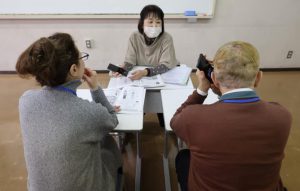Evacuee families in Hiroshima two years after Russia’s invasion of Ukraine, Part 4 — Tenuous relationships with local people, feelings of isolation
Feb. 24, 2024
Continued interest and support needed
by Kyoko Niiyama, Staff Writer
In early February, a couple from Ukraine could be seen studying Japanese at the Hiroshima YMCA College, in the city’s centrally located Naka Ward. The husband, 57, who had lost his vision from an illness when he was 21, cannot read the textbooks used in the lessons. With a sheepish smile, he said, “Since I can only learn by ear, it’s hard for me to make any progress.”
He had been living with his wife, 45, near Dnipro, a city in the eastern part of Ukraine. In the immediate aftermath of Russia’s military invasion, the husband had given up on the idea of evacuating from the country because he believed his visual impairment would make it difficult for them. Nevertheless, two months after the invasion, in April 2022, the couple left the country with the assistance of relatives and came to Japan, where they knew some people from Ukraine.
The couple now lives in public housing in Hiroshima City. The husband speaks halting Japanese, while his wife can only carry on simple daily conversations. With that, when they leave the house they typically use a translation app on their smartphones.
Limited number of places to go out
In Ukraine, he used to go everywhere by himself using a white cane. In Hiroshima, where he has limited familiarity with the local area, he finds it difficult to get around. As a result, the two mainly only go to a couple of spots — the Hiroshima YMCA and the Gion Community Center, located in the city’s Asaminami Ward. They attend a weekly Japanese class at each place. They sometimes attend gatherings for the visually impaired and socialize with foreign students studying in Japan or with Japanese friends. But their activities and connections to others remain limited.
The wife recently started working as a babysitter. However, the inconsistent work brings in little income. Back home in Ukraine, the husband was a professional accordion player. Although he wants to work to supplement his family’s income, he said, “I don’t know what to do under such limited circumstances.”
“Listen to our problems”
In Ukraine, when people faced difficulties, relatives and friends would come to visit, and the relationships with neighbors “provided emotional support and comfort.” They would communicate about such things as the best hospitals in the area and about which supermarkets had the best prices, and so on. The wife said quietly, “I sometimes wish there were people around who could listen to my daily problems.”
Naoko Takehara, 52, an instructor at the YMCA, offers her support to the couple. Upon hearing of their wish to use the swimming pool for exercise to maintain their health, she accompanied them on a tour of the facilities. While doing her best to help the couple, who are trying to live with optimism despite their difficulties, Ms. Takehara said, “I wish there were more people to help watch over them.”
Yoshimi Kojima, an associate professor at the Tokyo University of Foreign Studies who is knowledgeable about the lives of overseas residents living in Japan, is concerned about the lives of such people, who tend to get left behind as their period of evacuation grows longer. He explained the significance of providing long-term support to such people through collaboration between the public and private sectors. Ms. Kojima said, “Understanding and solving problems and concerns of evacuees will lead to easier lives for overseas residents from a diversity of backgrounds.”
The number of people forced to flee their home countries due to conflict and persecution is increasing around the world. Those in vulnerable positions are the first victims in conflicts among nations. People who have escaped from life-threatening crises are all around us. We are all in this together.
(Originally published on February 24, 2024)








